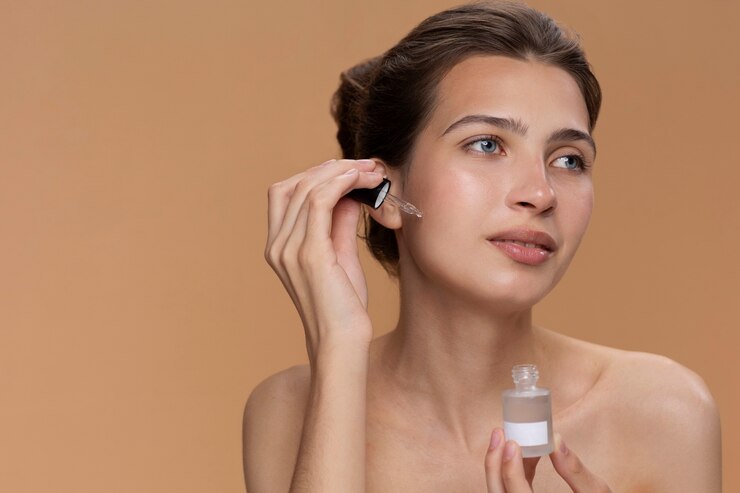Overview of Retinol Serum
Retinol serum has become a highly sought-after product in the world of skincare due to its powerful ability to address various skin concerns. Derived from vitamin A, retinol is known for its effectiveness in reducing the appearance of fine lines, wrinkles, and acne while promoting a more even skin tone. These benefits make it a versatile ingredient in anti-aging and skin rejuvenation routines.
Benefits of Using Retinol Serum
1. Reduces Fine Lines and Wrinkles
Retinol is known to boost collagen production in the skin, which naturally declines with age. Increased collagen helps to smooth out fine lines and wrinkles, resulting in firmer and more youthful-looking skin. Regular use of retinol serum can significantly minimize the signs of aging over time.
2. Improves Skin Texture and Tone
Uneven skin texture and discoloration are common concerns that retinol can address effectively. By accelerating cell turnover, retinol helps fade dark spots and smooth out rough patches on the skin, revealing a brighter and more even complexion.
3. Controls Acne and Breakouts
Retinol’s exfoliating properties make it an excellent treatment for acne-prone skin. It helps to unclog pores, reduce the formation of acne lesions, and decrease inflammation. Regular application of a retinol serum can help maintain clearer skin with fewer breakouts.
4. Enhances Skin Radiance
Increased cell turnover stimulated by retinol results in the shedding of dead skin cells, giving way to fresher, more radiant skin underneath. This glow-boosting effect is one of the primary reasons why retinol serums are a go-to for achieving healthy-looking skin.
Choosing the Right Retinol Serum
Not all retinol serums are created equal; they vary in concentration, formulation, and suitability for different skin types. Here are some factors to consider:
1. Concentration Level
Retinol serums come in various concentrations, typically ranging from 0.25% to 1%. Beginners are advised to start with a lower concentration (0.25%-0.5%) to minimize the risk of irritation. Higher concentrations (0.5%-1%) are more potent and are recommended for those with prior experience using retinol.
2. Formulation
Retinol serums can be found in various formulations, including water-based, oil-based, and cream-based. Water-based serums tend to absorb quickly and are ideal for those with oily or combination skin. Oil-based serums offer extra hydration, making them suitable for dry skin types.
3. Added Ingredients
Some retinol serums include additional ingredients like hyaluronic acid, peptides, and ceramides to enhance their benefits and reduce potential irritation. Hyaluronic acid adds moisture, peptides promote collagen production, and ceramides help strengthen the skin barrier.
4. Skin Sensitivity
Individuals with sensitive skin should look for serums that contain soothing ingredients like niacinamide or aloe vera to counteract potential irritation. Opting for a lower concentration retinol serum initially and gradually increasing the frequency of application can help the skin acclimate to retinol.
How to Use Retinol Serum Effectively
- Start Slowly: Introduce retinol into your skincare routine gradually, applying it once or twice a week to begin with. Increase usage as your skin builds tolerance.
- Apply at Night: Retinol can make the skin more sensitive to sunlight, so it’s best used during the nighttime skincare routine. Always follow up with a broad-spectrum sunscreen during the day.
- Moisturize: To prevent dryness and irritation, use a hydrating moisturizer after applying retinol serum. This helps maintain the skin’s moisture barrier.
- Avoid Mixing with Certain Ingredients: Retinol can be less effective or irritating when used in combination with certain skincare ingredients like benzoyl peroxide, AHA/BHA acids, or vitamin C. It’s best to use retinol separately to maximize its benefits.
Potential Side Effects and Precautions
While retinol is highly effective, it can cause side effects, especially when first introduced into a skincare routine. Common side effects include redness, dryness, and peeling.
- Skin Irritation: To minimize irritation, always start with a lower concentration and gradually increase the frequency of application.
- Sensitivity: Those with sensitive skin should consider using retinol serums formulated with added soothing ingredients to counteract potential irritation.
- Pregnancy and Nursing: Retinol is generally not recommended during pregnancy or breastfeeding. Consult with a healthcare professional before incorporating retinol into your skincare routine.
Top Tips for Maximizing Retinol Benefits
- Patience is Key: Retinol’s results are not instantaneous. Visible improvements in skin texture, tone, and reduction in fine lines typically occur over weeks to months of consistent use.
- Use Sunscreen: Since retinol increases skin’s sensitivity to UV radiation, daily application of sunscreen is essential to protect the skin from damage.
- Layering: Retinol works best on clean, dry skin. Apply the serum after cleansing and allow it to absorb before layering other skincare products.
Frequently Asked Questions about Retinol Serum
1. How long does it take to see results from retinol serum?
Results from retinol serum use can vary depending on the concentration and skin type. Improvements in skin texture and tone can be noticeable within 4-6 weeks, while more significant changes, such as reduction in fine lines and wrinkles, can take 12 weeks or longer.
2. Can retinol serum be used on all skin types?
Yes, but individuals with sensitive skin may experience irritation. It’s crucial to select a retinol serum that matches your skin type and start with a lower concentration if you have sensitive or dry skin.
3. Is retinol serum safe for daily use?
Once the skin builds tolerance, retinol can be used daily. However, it is recommended to start with 2-3 times per week and increase usage gradually to avoid irritation.
4. Can I use retinol serum with other skincare products?
Retinol can be used with most skincare products, but caution is advised when combining it with exfoliating acids (AHA/BHA) or vitamin C, as this may cause irritation. Moisturizers and hydrating serums pair well with retinol to mitigate dryness.
Conclusion
Retinol serum is a powerhouse in skincare, providing numerous benefits ranging from anti-aging effects to acne control and skin tone improvement. Selecting the right concentration and formulation for your skin type is crucial for maximizing its benefits while minimizing side effects. With proper use and patience, retinol serum can help achieve healthier, more youthful-looking skin.


